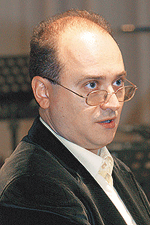> [Archived] Interviews

Interview with Composer Dan Dediu
Mister Dan
Dediu, on the evening of 13th
December, you will be accompanied, on a very interesting journey into
the universe of sounds, by a quartet of friends, Ion Bogdan
Ștefănescu, Emil Vișenescu, Răzvan Suma and Tibi Soare. What is
the proposal and the journey’s title which you are suggesting, in
premiere, to the public?
It is a triple concerto for flute, clarinet, cello and orchestra, a work that emerged from the junction of two works. One of them is for flute and clarinet, which hasn’t been finished and I have always had the feeling that I have to continue it, somehow and somewhere, into another work. A last piece remained hanging in my mind and, on the other hand, the second work, a concerto for cello and orchestra, also remained as an unfinished sketch. And after years, I restarted my work on the sketches, I saw that I could do something with that material and, somehow, from this leaven, there rose in my mind the possibility of writing a script, a concerto. The field that I have been lately approaching in my creation is this issue of the instrumental characters that is very close to opera characters, and so I had this vision of writing a triple concerto on which I worked for four years; and behold the result will be presented on the Radio’s stage in the company of great musicians and, at the same time, of close friends.
Why does it
have the title The Fever?
The title is a kind of secret programme of this concerto. The concerto has three parts. Each of these parts is, let’s say, like a pyramid, that tries to capture in sounds a couple of moods, through which we all pass, more or less, but we know them in a visceral way and they really approach this phenomenon of feverishness. The first part is entitled Delirium, the second Mirage-Mirages and the last one Paranoia. So, it’s about creating another world, entering the conflict of the two worlds and sometimes even more than two worlds, and I think that through this compositional arsenal, which uses three instruments that ally in different ways, at a certain moment they spy on each other, they fight, they love each other and at the end they gather in a bundle along with the big orchestra. All these things create the premises of an instrumental work; I could even say a sound adventure, which lasts for 25-26 minutes.
This
compositional way of yours of transgressing, to put it like that, a
universe of the opera lyrical theatre towards a symphonic one, for
how many years has it been staying in one of your creations?
There is a permanent tension. I couldn’t say, but I have always thought that writing a concerto or approaching its problems, and this is a concerto for three instruments, soloists and orchestra, I realise that I am entering a domain close to the dramatic theatre, to the opera, at the same time, being more free, not being attached to a libretto and achieving a sort of exponential rising, a sort of abstracting the sound material with which I can do many other things. So it’s a theatre of the imaginary, in principle, somewhere deep down we all are aware that the characters of the opera, as well as the soloists of the concerto, are only vehicles of tensions, primed, of some fights between principles.
Translated by Ioana-Alexandra Dumitrescu and Elena Daniela Radu
MTTLC, The University of Bucharest














